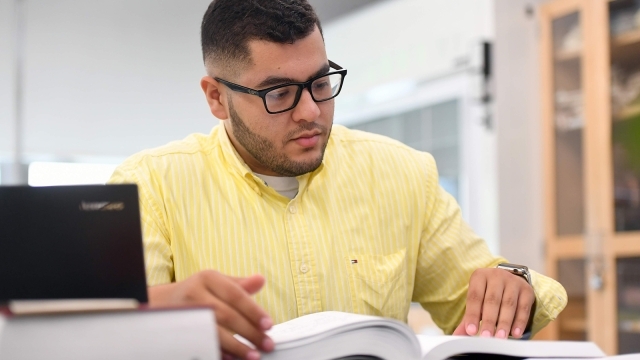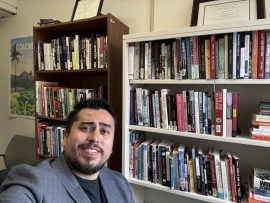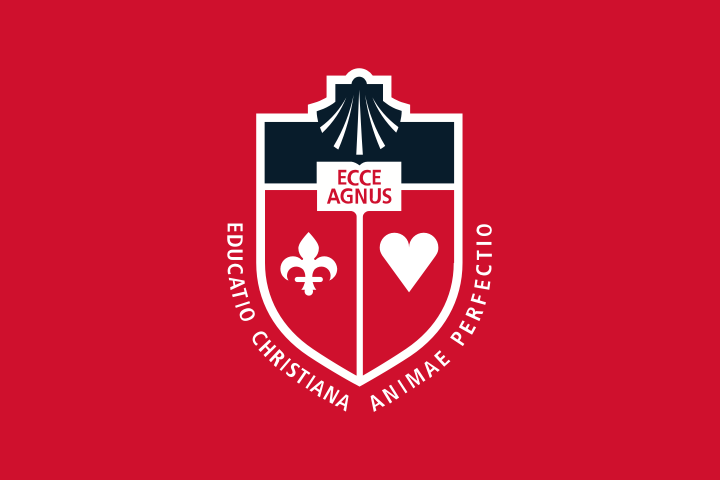

GR
Sociology, Master of Arts
The Master of Arts (M.A.) in Sociology degree program equips you with a strong foundation in theory and methodology so you can conduct impactful research for social justice at the local, regional, national, and global levels.
- Home
- Academics
- Majors and Programs of Study
- Sociology, Master of Arts
Earn a master's degree in Sociology from St. John's University in New York City!
Sociology is the scientific study of social life, change, and the forces that shape human behavior. Sociologists explore patterns of behavior, social inequality, systems of power and resistance, and the inner workings of social institutions. The field offers a range of quantitative and qualitative research methodologies that can be applied to nearly every aspect of social life, including cultural, ethnic, gender, racial, and sexual identities, practices, and structures; family dynamics; the impact of politics, institutions, and the law; violence; socioeconomic regimes; globalization; and community organizing.
At St. John’s University, the Master of Arts (M.A.) in Sociology stands out for its critical, global, and action-oriented approach. With a vibrant, interdisciplinary community of faculty and students, the program prepares you to tackle today’s most pressing social challenges. Whether you’re interested in research, advocacy, policy, or community work, you’ll gain the skills to make a real impact.
The program offers flexibility, as you can complete the degree in various formats. You have the option to participate in a hybrid format, combining in-person and online courses. It is designed to fit into the life of a wide range of working professionals.
The Department of Sociology and Anthropology is a vibrant, interdisciplinary, and diverse community that allows graduate students to engage in opportunities beyond the classroom. This includes guest lectures, symposia, research collaborations, student-led publications, as well as networking events such as Criminology Connections (held very fall) and Sociology Connections (held every spring).
- Degree Type
- MA
- Area of Interest
- Social Sciences
- Associated Colleges or Schools
- Program Location
- Queens Campus
- Required Credit Hours
- 33
At St. John’s University, the Master of Arts (M.A.) in Sociology stands out for its critical, global, and action-oriented approach. With a vibrant, interdisciplinary community of faculty and students, the program prepares you to tackle today’s most pressing social challenges. Whether you’re interested in research, advocacy, policy, or community work, you’ll gain the skills to make a real impact.
Department Contact
Watch our video
Admission
Eligible students possess a baccalaureate degree with an overall GPA of 3.0 and 18 undergraduate credits in sociology or a related social science. All applicants must possess a baccalaureate degree from an accredited institution or the international equivalent prior to enrollment at the graduate level. In addition to the application form and non-refundable application fee, candidates should submit the following:
- Statement of professional goals and resume
- Official transcripts from all undergraduate, graduate, and professional schools attended.
- Two (2) letters of recommendation obtained from professional and/or academic references.
- Official TOEFL, IELTS, or Duolingo scores are required for applicants whose native language is not English.
- Students with international credits must also submit a course-by-course foreign credit evaluation with GPA calculation from a NACES member.
Competitive assistantships are available for qualified full-time students. Please visit Graduate Assistantships and Fellowships for more information.
For additional information, please contact:
Office of Graduate Admission
718-990-1601
[email protected]
Featured Faculty







-
Professor,
Graduate Director for Criminology & Justice,
- Assistant Chair
Department
Sociology and Anthropology
Courses
The M.A. in Sociology degree program consists of 33 credits; 18 are core requirements and 15 are electives. Coursework is designed for you to master sociology’s theoretical and methodological foundations and engage with key thematic areas of study in the field. The learning process culminates with the completion of an in-depth project monitored through the research methods sequence and a comprehensive examination at the end of the program.
SOC 103 Proseminar
SOC 127 Statistics
SOC 127L Statistics Lab (0 credit)
SOC 210 Classical Social Theory
SOC 212 Contemporary Social Theory
SOC 300 Social Research: Strategies and Tactics
SOC 301 Evaluation Research and Data Analysis
*Elective classes are offered on a semester-by-semester basis.
SOC 260 Inequality and Oppression
SOC 244 Social Movements and Globalization
SOC 208 Cultural Studies
SOC 310 Decolonial Sociologies
SOC 218 Immigration and Inequalities
SOC 234 Global Poverty
SOC 217 Gender and Sexualities in a Global Context
SOC 117 Family Violence
SOC 209 Human Trafficking Contemporary Slavery
SOC 120 Race and Ethnicity
SOC 246 Political Sociology
SOC 201 Economic Sociology
SOC 223 Urban Sociology
You can also choose to take up to two electives from our sister criminology program, including Class, Race, and Criminal Justice; Law and Global Society; Policing and Society; Restorative Justice; and Women and Crime.
Please review the Graduate Bulletin for the complete list of course offerings.
Career Outcomes
As a graduate of the St. John’s University M.A. in Sociology degree program, you apply methodological, statistical, and theoretical sociological knowledge to careers in various fields in the nonprofit, public, and private sectors. Our alumni have been employed in banking, civil services, criminal justice, education, finance, psychology, social work, and technology.
The US Bureau of Labor Statistics reports that the job outlook for sociologists is projected to grow seven percent from 2023 to 2033, faster than average for all occupations. Graduates currently working in a related field have often advanced in their positions and been promoted. Many work with underprivileged populations, as well as collaborate in the design of public policies and social programs dismantling social inequalities. Our alumni also pursue doctoral studies in history, law, psychology, sociology, and related disciplines.
A 2024 St. John’s alumni survey revealed that respondents reported high job satisfaction because of their ability to apply learned skills in their positions. “My favorite aspect of the M.A. was the overwhelming knowledge and experience of professors and leaders in the department,” said Nicholas Lachance ’23G. “The program not only helped me understand social sciences on a more in-depth level, but also helped me get opportunities in the field I wouldn’t have been able to without the degree. Social sciences are important in helping us all understand the world.”
Additional Information
For additional information about our program and the field of sociology, please contact the Department of Sociology and Anthropology, St. John Hall, Room 444D, 718-990-6296 or 718-990-5667. You may also visit the websites of the American Sociological Association and the International Sociological Association.
Interested in Social Sciences, but not sure if Sociology, Master of Arts is right for you?
Related Programs
GR
The M.A. in Criminology and Justice at St. John's offers a rigorous academic foundation in criminology and the skills to analyze crime-related data and research.
- Queens Campus
UG
The combined Bachelor of Science (B.S.) and Master of Arts (M.A.) program in Criminal Justice and Sociology will allow you to develop these valuable skills and complete both degrees in just five years of full-time study.
- Queens Campus
UG
A minor in Sociology is the perfect complement to majors in social sciences, humanities, and professional areas such as Anthropology, Art, Biology, Government and Politics, History, Journalism, Legal Studies, Psychology, and Public Health among others.
- Queens Campus
UG
You can complete both a Bachelor of Arts (B.A.) in Psychology and a Master of Arts (M.A.) in Criminology and Justice in just five years of full-time study through this combined degree program, offered by St. John’s College of Liberal Arts and Sciences.
- Queens Campus
GR
The Master of Arts (M.A.) in Psychology at St. John's provides you with a broad background of psychological knowledge and tools as preparation for more advanced work in the field.
- Queens Campus
UG
The combined B.A./M.A. program in Sociology offers highly-motivated students the opportunity to complete their undergraduate and graduate degrees in five years of full-time study.
- Queens Campus
Take the Next Step

Explore Affordability
The Office of Student Financial Services is committed to providing students and their families with the information they need to navigate and understand the financial aid and payment process.
Apply to St. John's
St. John’s offers a free online application for all 100+ undergraduate programs, and graduate applications carry a low cost for most programs.
